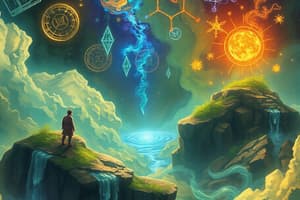Podcast
Questions and Answers
What fundamental component characterizes the process of scientific inquiry?
What fundamental component characterizes the process of scientific inquiry?
- Theory development without experimentation
- Direct confrontation with the natural world (correct)
- Accumulative learning without testing
- Observing and making wild guesses
Which field primarily focuses on the statistical study of human populations?
Which field primarily focuses on the statistical study of human populations?
- Demography (correct)
- Political Philosophy
- Sociology
- Psychology
Which branch of science is primarily concerned with theoretical models rather than direct observation?
Which branch of science is primarily concerned with theoretical models rather than direct observation?
- Applied Science
- Natural Science
- Abstract Science (correct)
- Social Science
What is the primary focus of the field of logic as it is defined in the content?
What is the primary focus of the field of logic as it is defined in the content?
Which of the following best describes the field of metaphysics?
Which of the following best describes the field of metaphysics?
Which of the following correctly describes the relationship between science and technology?
Which of the following correctly describes the relationship between science and technology?
What was a significant contribution of the Babylonian Civilization?
What was a significant contribution of the Babylonian Civilization?
What is the primary activity associated with technology as mentioned in the content?
What is the primary activity associated with technology as mentioned in the content?
Which ancient civilization is recognized for the construction of the Great Pyramid of Giza?
Which ancient civilization is recognized for the construction of the Great Pyramid of Giza?
Which aspect is NOT linked to the importance of science and technology?
Which aspect is NOT linked to the importance of science and technology?
Flashcards are hidden until you start studying
Study Notes
Science
- A structured collection of knowledge acquired through experimentation
- A practice involving investigation of the natural world
- Follows the Scientific Method: Observation, Problem Identification, Hypothesis, Experimentation, Conclusion
Major Fields of Science
- Social Science: Studies human societies and behavior
- History: Investigates past events using historical records and evidence
- Psychology: Examines human thought and behavior, both individually and in groups
- Sociology: Analyzes social life, change, and the impact of actions on human behavior
- Demography: Analyzes population statistics (birth and death rates)
- Abstract Science: Focuses on theoretical models and concepts rather than direct observation
- Computer Science
- Geometry
- Logistics
- Mathematics
- Logic: The science and art of reasoning correctly
- Philosophy: Examines theoretical foundations
- Ethics: Determines what is of value
- Metaphysics: Explores what exists
- Aesthetics: Investigates beauty
- Epistemology: Examines how we gain knowledge
- Logic: Analyzes how we reason
- Political Philosophy: Explores the best way to govern societies
- Natural Science: Focuses on physical matter, energy, and their interactions
- Physics/Physical: Studies matter, energy, and their interactions
- Biology: Studies living organisms
Technology
- Applied Science: Encompasses intangible techniques and know-how processes, influenced by historical and cultural contexts.
- Widely present in various geographical locations
- The use of scientific knowledge to produce, improve, distribute goods and services, and fulfill material needs
- Technological innovation is its core activity
Society
- Utilizes scientific advancements to create better technologies for meeting its needs
- Dynamic relationship with science and technology:
- Science relies on technological infrastructure for research and development.
- Technology advancements require scientific inputs for research and development.
- Experience and practical application contribute to technological progress.
Importance of Science and Technology
- Increases national economic strength and productivity
- Improves the efficacy and scope of medical care
Science and Technology Historical Antecedents
- Ancient Times (3800 B.C.– A.D. 1200)
- Sumerian Civilization: Earliest form of civilization, developed cuneiform writing and metallurgy.
- Babylonian Civilization (3500 B.C.– 500 B.C.): Popularized the Bronze Age, known for architecture, and calculated pi as 3 (modern approximation is 22/7 or 3.142).
- Egyptian Civilization: Constructed the Great Pyramid of Giza, one of the seven ancient wonders, in honor of King Khu Fu.
- Cretan (Minoan) Civilization
- Greek Civilization (1100 B.C.– 1300 B.C.): Built the Parthenon, a temple dedicated to Goddess Athena.
- Persian Civilization
- Roman Civilization
- Arabic/Islam Civilization: Constructed the Peruvian Canal, recognized as a World Heritage Site.
- 1st Industrial Revolution (1760-1840):
- Used water and steam to mechanize production.
- Bessemer Steel Processing: Employed metal and steam machines to build industries (1801-1899).
- 2nd Industrial Revolution (1870):
- Introduced new technologies, including electricity, gas, and oil as energy sources.
- Enabled mass production using electricity.
- Carl Benz and Gottlieb Daimler created cars (1885) under the name Mercedes-Benz.
- The Sirius Ship completed a 19-day voyage through the English Channel and across the Atlantic Ocean (1838).
- 3rd Industrial Revolution (1969):
- Utilized nuclear energy as a new energy source, leading to the rise of electronics.
- Employed electronics and information technology to automate production.
- Industry 4.0 (Present):
- Characterized by the rise of the internet.
- Combines technologies that blur the lines between physical, digital, and biological spheres, transforming industries globally.
- Apple Computer Design Evolution: Popularized by Steve Jobs
- Dalton’s Atomic Theory:
- John Dalton (1766-1844) proposed that atoms are the smallest particles of an element.
- Periodic Table of Elements:
- Dmitri Mendeleev (1884-1907), a Russian inventor, developed the periodic table.
- The Discovery of Radium and Pollonium:
- Marie Curie (1902):
- First scientist to win two Nobel Prizes.
- Discovered that these elements are radioactive and can be used for cancer treatment (radiation therapy).
- First woman to obtain a degree in Physics.
- First woman to graduate in France.
- First woman to win a Nobel Prize.
- First woman to hold a chair at the Sorbonne.
- Marie Curie (1902):
- Information Age (1970s-present):
- Also known as the Computer Age, Digital Age, or New Media Age.
- Characterized by easy access to information and knowledge.
- Steve Jobs introduced the MAC/Macintosh Computer (1984), a significant contribution to the Information Age.
Module 2: Intellectual Revolutions that Defined Society
- Acknowledges the paramount influence of science and technology on society
- The 1987 Philippine Constitution states the government’s commitment to:
- Prioritization of research and development (R&D), inventions, innovations, and their applications.
- Support for indigenous, appropriate, and self-reliant scientific and technological capabilities.
- Incentives for private participation in scientific research, as mentioned in Article XIV Section 11 .
- Scholarships and grants for deserving science students, researchers, scientists, inventors, technologists, and highly skilled individuals.
- Regulation of technology transfer to benefit the nation, as outlined in Article XIV Section 12 .
- Encouragement of private groups, local governments, and community organizations to contribute to science and technology.
- Protection of intellectual property rights for scientists, inventors, artists, and other gifted citizens, as stated in Article XIV Section 13.
- DOST (Department of Science and Technology) formulated the Harmonized National R&D Agenda (HNRDA) 2017-2022 to direct scientific and technological efforts towards maximizing economic and social benefits for the people.
- AmBisyon Natin 2040: Focuses on three key aspects:
- Malasakit (Compassion)
- Pagbabago (Change)
- Kaunlaran (Prosperity)
Module 4: Human Flourishing in Terms of Science & Technology
- Human Flourishing: Refers to human potential achieved through innate abilities and characteristics, enabling survival and fulfilling functions in the environment, guided by values and virtues.
Technological Determinism
- Asserts that technology shapes human society and behavior.
- This view believes that technology controls human actions.
- Haag: Technology poses issues, such as high cost, generates new problems, creates harmful effects and unpredictable damage.
Technological Optimism
- Believes that technology can solve societal problems and improve human lives.
- Technocrats: Advocate for technology as the highest authority.
Existentialism
- Martin Heidegger (1896-1996):
- Father of Existentialism
- Examined the dual definitions of technology:
- It is a means to an end.
- It is a human activity.
- Emphasizes the importance of choices made in technological advancement.
- Heidegger explored causality by identifying four causes for existence:
Aristotle’s 4 Causes
- Causa Materialis/Efficient Cause: "What is it made of?"
- Causa Formalis/Formal Cause: "What shape or design defines it?"
- Causa Finalis/Final Cause: "What is the purpose of the object?"
- Causa Effeciens/Efficient Cause: "Who made it?"
The Mode of Revealing in Modern Technology
- Unlock and expose: Nature only reveals itself when challenged.
- Stock piles for future use: Technology, as a means to an end, is aimed towards fulfilling future demands.
Module 5: When technology and humanity cross
- Humanity: Derives from the Latin word "humanistas," meaning "human nature, kindness."
- Encompasses all human beings and refers to feelings humans typically express toward one another.
Advantages, Disadvantages, and Limitations of Technology
- Importance of Technology to Humanity: Highlights the impact of technology on various aspects of human life.
- Advantages of Technology to Humanity:
- Simplifies life (vehicles, stoves).
- Speeds up travel.
- Makes communication easier, faster, and cheaper.
- Improves living standards.
- Advances human capabilities (artificial technology).
- Enables achievements previously considered impossible (medicines).
Studying That Suits You
Use AI to generate personalized quizzes and flashcards to suit your learning preferences.




